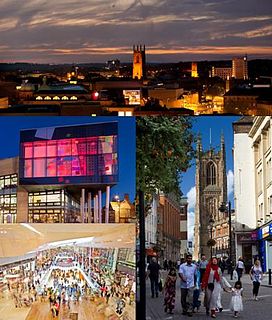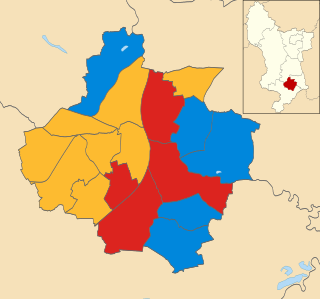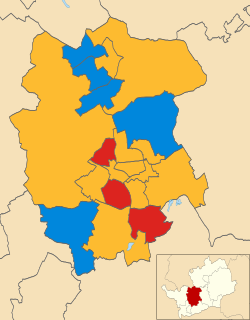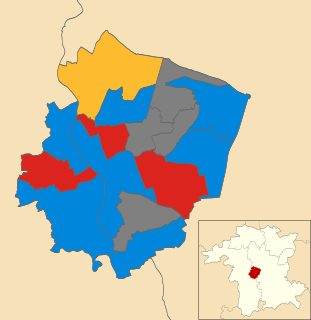The 2004 Derby City Council election took place on 10 June 2004 to elect members of Derby City Council in England. One third of the council was up for election and the council stayed under no overall control. [1]

Derby is a city and unitary authority area in Derbyshire, England. It lies on the banks of the River Derwent in the south of Derbyshire, of which it was traditionally the county town. At the 2011 census, the population was 248,700. Derby gained city status in 1977.

Derby City Council is the local government unitary authority for Derby, a city in the East Midlands region of England. It is composed of 51 councillors, three for each of the 17 electoral wards of Derby. Currently there is no overall control of the council, with the Labour Party being the biggest party. The acting council chief executive is Christine Durrant. Carole Mills will take over as Chief Executive from August 2018.

England is a country that is part of the United Kingdom. It shares land borders with Wales to the west and Scotland to the north-northwest. The Irish Sea lies west of England and the Celtic Sea lies to the southwest. England is separated from continental Europe by the North Sea to the east and the English Channel to the south. The country covers five-eighths of the island of Great Britain, which lies in the North Atlantic, and includes over 100 smaller islands, such as the Isles of Scilly and the Isle of Wight.
Contents
The results saw the Labour party gain a seat from the Conservatives but lose one to the Liberal Democrats. [2] They also saw Frank Leeming from the United Kingdom Independence Party win the party's first council seat in Derby, [3] gaining a seat that had formerly been held by independent, Ron Allen, who had died in March. [2] Leeming was expected to hold the balance of power on the council between Labour and a Liberal Democrat/Conservative alliance depending on the outcome of a by-election in July. [2]
The Labour Party is a centre-left political party in the United Kingdom which has been described as an alliance of social democrats, democratic socialists and trade unionists. The party's platform emphasises greater state intervention, social justice and strengthening workers' rights.

The Conservative Party, officially the Conservative and Unionist Party, is a centre-right political party in the United Kingdom. Presently led by Theresa May, it has been the governing party since 2010. It presently has 314 Members of Parliament in the House of Commons, 249 members of the House of Lords, and 18 members of the European Parliament. It also has 31 Members of the Scottish Parliament, 12 members of the Welsh Assembly, eight members of the London Assembly and 9,008 local councillors. One of the major parties of UK politics, it has formed the government on 45 occasions, more than any other party.

The Liberal Democrats are a liberal political party in the United Kingdom. They presently have 11 Members of Parliament in the House of Commons, 96 members of the House of Lords, and one member of the European Parliament. They also have five Members of the Scottish Parliament and a member each in the Welsh Assembly and London Assembly. The party reached the height of its influence in the early 2010s, forming a junior partner in a coalition government from 2010 to 2015. It is presently led by Vince Cable.
After the election, the composition of the council was
- Labour 24
- Liberal Democrat 14
- Conservative 11
- United Kingdom Independence Party 1
- Vacant 1 [4]















